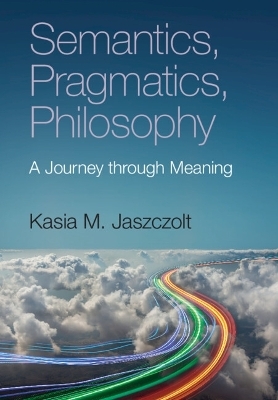
Semantics, Pragmatics, Philosophy
Cambridge University Press (Verlag)
978-1-108-73104-1 (ISBN)
Semantics and pragmatics – the study of meaning, and meaning in context, respectively – are two fundamental areas of linguistics, and as such are crucial to our understanding of how meaning is created. However, their theoretical ideas are often introduced without making clear connections between views, theories, and problems. This pioneering volume is both a textbook and a research guide, taking the reader on a journey through language and ultimately enabling them to think about meaning as linguists and philosophers would. Assuming no prior knowledge of linguistics, it introduces semantics, pragmatics, and the philosophy of language, showing how all three fields can address the 'big questions' that run through the study of meaning. It covers key theories and approaches, while also enabling increasingly more sophisticated questions about the interconnected aspects of meaning, with the end goal of preparing the reader to make their own, original contributions to ideas about meaning.
Kasia M. Jaszczolt (pronounced Yashchout) is Professor of Linguistics and Philosophy of Language at the University of Cambridge and Professorial Fellow of Newnham College, Cambridge. Notable publications include Meaning in Linguistic Interaction (2016, Oxford University Press), Representing Time (2009, Oxford University Press), Default Semantics (2005, Oxford University Press) and The Cambridge Handbook of Pragmatics (co-edited with Keith Allan, 2012, Cambridge University Press).
Preface and tips on how to read this book; Acknowledgements; List of abbreviations and symbols; Stage 1. Introduction: meaning – what it is and where to find it: 1.1 How (not) to study meaning; 1.2 Semantics, pragmatics, and philosophy (and why they are best done together); 1.3 Proposition: a flexible unit for studying meaning?; 1.4 Meaning and its correlates; Stage 2. word meaning and concepts: 2.1 Harnessing word meaning; 2.2 The 'concept' commotion; 2.3 Language and thought; 2.4 Lexicon and pragmatics; 2.5 The role of reference; Stage 3. Composing sentence meaning: tools and their purpose: 3.1 Truth in service of meaning: truth conditions and truth-value judgements; 3.2 The metalanguage for the logical form; 3.3 Possible worlds and models; 3.4 Semantic composition and semantic types; 3.5 Type-theoretic metalanguage and lambda abstraction; 3.6 Formal tools and cognitive reality; Stage 4. Operations on sentences: 4.1 Sentential connectives and propositional logic; 4.2 Conjunction; 4.3 Disjunction; 4.4 Conditional and biconditional; 4.5 Negation; 4.6 Linguistic diversity: snakes and ladders, cluedo, and monopoly; Stage 5. Inside the sentence: 5.1 Limitations of the metalanguage; 5.2 Quantification; 5.3 Representing time; 5.4 Modality; 5.5 Propositional attitude reports; 5.6 Interim conclusions: semantic tools for formal cognitive representations?; Stage 6. Conveying information: 6.1 From sentences to discourses: dynamic semantics for dynamic meaning; 6.2 Referring and its tools; 6.3 Organizing information in discourse; Stage 7. Utterance meaning, or what lurks under the surface: 7.1 Saying, implicating and inferring; 7.2. Truth-conditional vs. non-truth-conditional, semantic vs. pragmatic: what to include and what to leave out; 7.3 Keeping semantics and pragmatics apart; Stage 8. Meaning in service of its makers: 8.1 Who needs literal meanings?; 8.2 What makes a metaphor; 8.3. Speech and action; 8.4 At a crossroads with ethical and social debates; Stage 9. Conclusion: the future of meaning?; Index.
| Erscheinungsdatum | 27.03.2023 |
|---|---|
| Zusatzinfo | Worked examples or Exercises |
| Verlagsort | Cambridge |
| Sprache | englisch |
| Maße | 171 x 245 mm |
| Gewicht | 850 g |
| Themenwelt | Geisteswissenschaften ► Philosophie ► Sprachphilosophie |
| Geisteswissenschaften ► Sprach- / Literaturwissenschaft ► Sprachwissenschaft | |
| ISBN-10 | 1-108-73104-X / 110873104X |
| ISBN-13 | 978-1-108-73104-1 / 9781108731041 |
| Zustand | Neuware |
| Informationen gemäß Produktsicherheitsverordnung (GPSR) | |
| Haben Sie eine Frage zum Produkt? |
aus dem Bereich


